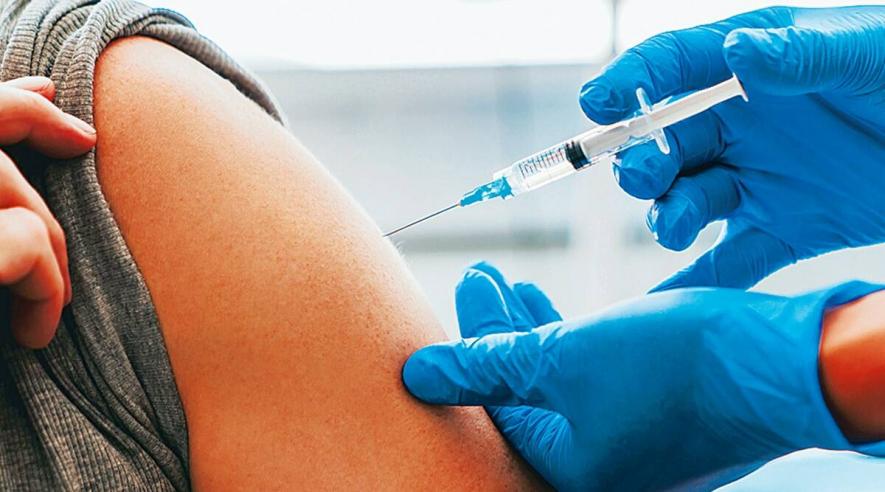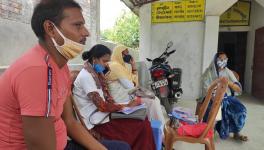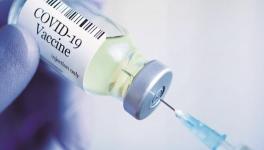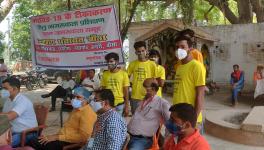COVID-19: Can Mixing of Different Vaccines Boost Immune Responses?

Representational Image. Image Courtesy: The Indian Express
The usual vaccination scheme for COVID-19 has been to administer both doses of the same type of vaccine. Most of the vaccines authorised require two doses within a gap of a few weeks or months. However, some countries are experimenting with mixed doses as part of a new programme, which means that the people receive one shot from one vaccine and the other shot from another vaccine.
Canada and several other European countries are now recommending this mixed vaccine in some patients. Some early data coming out of such experiments have been published and they provide an early hint of probable benefits of such a policy.
In this context, three recent studies can be taken into consideration, where it has been found that having a dose of the Pfizer-BioNTech vaccine after one dose of the Oxford-AstraZeneca vaccine can elicit more efficient immunity.
One study from Spain, published in Lancet, reported that 448 participants who received the Pfizer-BioNTech (PB) vaccine eight weeks after getting the Oxford-AstraZeneca (OA) dose showed robust antibody response when analysed after two weeks from the last dose. The study concluded that there were no serious adverse events registered among the participants. The antibody response was examined against the spike protein, a key protein of SARS-CoV-2 for infecting human cells.
The other study is from Charité University Hospital, Berlin. Leik Eric Sander, an infectious disease expert of the University, along with his colleagues found that the 61 health care workers who were given the two shots in the same order as the study from Spain, showed antibodies against the spike protein at a comparable level with a control group who received two doses of the PB vaccine. The mixed vaccines were administered at a gap of 10 to 12 weeks. The study even reported having found that the T cells of those who received the mixed vaccines were better in comparison to those who got both doses of PB alone. Yet another study in Germany also showed comparable results.
Also read: Neutralising Antibodies Can be Marker of COVID-19 Vaccine Efficacy
However, there is a caveat. Mathew Snape, a vaccine expert at the University of Oxford, and his colleagues are now studying eight vaccine permutations and this study involves about 100 participants. Here as well, the OA and the PB vaccines are used in different permutations at an interval of either four or twelve weeks.
In May, Snape’s group published an early report in Lancet that when the participants received the PB vaccine after just four weeks of the OA vaccine, they showed significantly more side effects in comparison to those who received both the doses of the same vaccine type. However, the immune response data is yet to come out.
Here arises another question—is it the mixing of vaccines or the dose intervals that is important in generating immunity? Snape, at this point put forward the view that the combination vaccines are showing promising results so far, however it is yet to be resolved whether any improvement in T cell response results from longer dose intervals rather than the mixing.
A few countries, however, have recommended this combination vaccine, including Spain which has authorised it for people under the age of 60 years, Canada, Germany, France, Norway, and Denmark have also made similar recommendations.
Talking about the practical applicability of mixed vaccines, eminent vaccine specialist and professor at Christian Medical College, Vellore, Gagandeep Kang told NewsClick, “Spain authorised the mixing of vaccines after it made the decision not to use the AstraZeneca vaccine in younger individuals. The data from the CombiVacS study indicates that the immune responses with the mixing of doses are better than if two doses of the AstraZeneca vaccine are used. This is reassuring data that supports the use of vaccines in a mixed schedule. ”
She added, “For immunisation programmes, particularly in developing countries and when supplies are limited, it is very useful to know if the vaccines can be mixed. Wherever the delivery of vaccines is challenging, or if people are inconvenienced or find it difficult to access a vaccination centre, then making sure that any vaccine that is available at a vaccination centre can be given to all attendees is particularly valuable.”
Also read: How Getting a Vaccine in India Is a ‘Privilege’ Especially For Those in Rural Areas
Prof Satyajit Rath, adjunct faculty at IISER, Pune, had a similar view. He said, “They certainly have real-life utility. As we know, inadvertent 'mixing' can happen, and it is good to know what the consequences would be. Also, since the supply of any one vaccine can be erratic especially because the huge scale of the COVID-19 vaccination program, it is useful to know if such 'mixing' can be done safely and usefully. And finally, there may even be some modest but real advantages to some such 'mixed' protocols in specific situations, and it would be useful to have evidence about that possibility, too.”
On being asked whether mixing two types of vaccines can give the immune system multiple ways to recognise a pathogen (generally, it is said that mRNA vaccines are good at inducing antibody responses while vector-based vaccines are better at triggering T cell responses), Kang said, “Yes, mixing two types of vaccines gives the immune system multiple ways to recognise a pathogen. It may be possible to combine two different vaccination platforms where we can ensure both early and high levels of short-term and long-term protection.”
“However,” she added, “in the immunogenicity studies that are planned, we will only have the immunogenicity readouts and not a measure of the protection afforded by mixed schedules at this time. Since samples will be banked, when we have a correlate of protection, it may be possible to interpret the data from mixed schedules for protection as well.”
Another important question is if the idea is at all implementable, then what would matter the most – the types of vaccine or the duration between the doses or the order in which the doses are applied or a combination of all of these?
Also read: COVID-19: Vaccination Experiment in a Brazilian Town Reveals Surprising Results
Prof. Kang explained, “For scheduling patients for immunisation it is important to know which types of vaccines are to be given to which individuals and at what time points. A fully flexible schedule, where any vaccine can be given or in any schedule is the ideal. If the immunogenicity studies show that the ordering of vaccines, i.e. which one goes first and which one is next, or differences in intervals between doses, make significant differences to the immune response, then it becomes somewhat more challenging to implement the programme.”
Even if several countries have recommended the mixing of vaccines, there remains a crucial aspect; that is what should be the premise if a country plans to start such a mixed vaccine experiment?
Talking about it, Rath told NewsClick, “All such 'experiments' have to be formal clinical trials, more or less at the level of a phase 1-2 clinical trial. The premise would be that 'mixed' protocols would give rise to at least as much of an antibody response as the approved single-vaccine protocols would (and possibly more!).”
Suggesting measures that can be adopted in India, Kang said, “I think it is very important for all countries that are using multiple vaccine platforms to understand how different combinations are likely to work. It is not required that every country should do its own mix and match schedules as studies, if data on the same vaccine combinations are available from other countries.”
She further said that, “For India, where many of the vaccines being used are likely to be made by Indian manufacturers, it is important that we initiate these studies as early as possible, to inform our own immunisation programme and also when Indian vaccines are exported, make these data available for the world.”
Get the latest reports & analysis with people's perspective on Protests, movements & deep analytical videos, discussions of the current affairs in your Telegram app. Subscribe to NewsClick's Telegram channel & get Real-Time updates on stories, as they get published on our website.
























